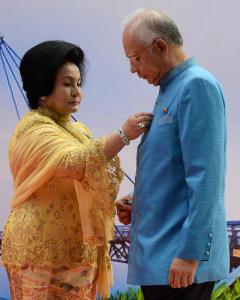July 31, 2015
Malaysia: Big Momma takes on Governor Zeti
by John Berthelsen@www.asiasentinel.com
http://www.asiasentinel.com/politics/malaysian-pm-wife-seeks-central-bank-governor-ouster/
Two powerful women take center stage in spreading scandal as government clings to power
Prime Minister Najib Razak’s controversial wife, Rosmah Mansor, is trying to drive another powerful woman, internationally respected Bank Negara Governor Zeti Akhtar Aziz, out of the central bank, according to knowledgeable sources in Kuala Lumpur.
Rosmah is said to be enraged over leaks of her personal financial details. She also fears that Zeti has detailed information on the 1Malaysia Development Bhd. scandal that could bring down the government and the prime minister. Insiders say Rosmah, a lightning rod for criticism over her lavish spending, is the field marshal directing the defense of her beleaguered husband’s government.
“My own view is that Najib will fight to the political death because of the wife,” a longtime academician and political analyst told Asia Sentinel. “She is much stronger than Najib and will not accept any retirement package. She is powerful in her own right.”
The year-long scandal has paralyzed Malaysian politics and played a major role in weakening the economy as Najib twists and turns to keep his enemies at bay. Earlier this week, Najib sacked several members of his cabinet for apparent disloyalty; he has also moved against critical news outlets.
Independent authority
Driving Zeti out won’t be easy. The Central Bank Act of 2009 – ironically passed that year at Zeti’s request after Najib became Prime Minister – insulates the central bank from political influence.
The Governor can only be appointed or fired by the Malaysian King, a rotating monarchy that passes among nine sultans. The current King is from Kedah, the home state of Mahathir Mohamad, Najib’s most implacable enemy. The King reportedly has told Mahathir he is staying out of the matter so that the law can take its course.
Rosmah is said to have targeted Zeti after the Sarawak Report published details on July 9 about the deposit of RM2 million [US$523,400] into her account in Affin Bank, after which Rosmah demanded that Zeti find out who leaked the information within 72 hours or resign. When Zeti apparently declined, she came under attack from blogs said to be linked to Rosmah.
Blogs in the fray
One of the blogs, “Fromtheeleventh,” alleged that the police Special Branch intelligence unit is investigating Zeti and three other Bank Negara officials for sedition and carrying out a parallel investigation into Selangor state water contracts involving Zeti’s husband, Tawfiq Ayman, and their son Alif.
The blog also alleged that Tawfiq is being investigated for allegedly illegal commissions paid in a bank deal in which third parties benefited from insider information, supposedly which could have been provided by the central bank.
“By virtue of the close relationship between husband and wife, Ayman has access to confidential information that has been used for his benefit in his business dealings,” the blog said, indicating that “new information” had been supplied to investigators.
“The husband is a little shaky,” said a Malaysian businessman, “but Zeti has always acted quite properly.” Another extremely well-informed source told Asia Sentinel, “I would totally believe that Rosmah would try to push Zeti out if she felt threatened.
Bank Negara does have lots of smoking guns on all the dodgy bank transfer documentation, both involving Rosmah and also Najib, 1MDB etc. Zeti isn’t an angel and there could be dirt on her somewhere that could be used, though she’s not been associated with any major personal scandals that I can recall. It’s more that she’s gone along with wonky stuff as required by politics and maybe got rewarded for her compliance.”
But, he said, “I do believe she still thinks of herself as a professional central banker, so she might actually draw the line here. My impression is that Bank Negara is the most likely of all the investigative entities to really be able to pin something on Najib and Co.”
Long career
Zeti has been with the bank for 36 years, becoming governor in 2000. She was named one of the world’s best central bank chiefs by Global Finance Magazine in 2009 and several times since, and a Bloomberg columnist picked her as one of his favorites to head the International Monetary Fund after Dominique Strauss-Kahn was arrested on sexual assault charges in 2011.
According to one political analyst, Rosmah is believed to have been behind the dramatic ouster of cabinet members earlier this week, including attorney general Gani Patail and Deputy Prime Minister Muhyiddin Yassin, replacing him with uber-loyalist Ahmad Zahid Hamidi, the home minister. To replace fired cabinet members, who were involved in an investigation of 1MDB, Najib appointed members of a parliamentary committee probing 1MDB. Critics say that committee was designed to nullify the cabinet-level investigation, which is now presumably neutralized.
Rosmah is also supposedly furious over the role former Premier Mahathir Mohamad has played in undermining Najib. “She thinks Mahathir and gang are behind the campaign to pull down 1MDB and the Sarawak Report,” said a well-informed academic.
More evidence?
If the gossip mills in Kuala Lumpur are right, and Rosmah is indeed trying get Zeti sacked, the most likely reason – beyond personal pique – is that the Bank Negara Governor is in possession of a report forwarded to her on March 13 by the Monetary Authority of Singapore that is said to contain damaging information about accounts related to 1MDB. So far Zeti has refused to talk about the contents of the report, although she said it would be forwarded to other enforcement agencies looking into the scandal. According to Sarawak Report, the account contains merely paper assets whose true value can’t be determined.
Zeti is feeling her way cautiously through the politically fraught scandal, which involves questions over not just massive debts of RM42 billion [US$11.8 billion] but that as much as US$680 billion allegedly was diverted from companies linked to 1MDB into Najib’s personal account, supposedly to be used illegally to fund the ruling national coalition’s successful 2013 general election campaign.
“Disclosures will stop all investigations if we talk about it,” Zeti told local media. Although she has been criticized by opposition figures and Mahathir for the central bank’s tardiness in moving ahead on the investigation, Zeti is generally regarded as having played a neutral role.
Over recent weeks, Najib has suspended the publishing license for three months of The Edge Financial Daily and its sister publications, which played a major role in exposing 1MDB irregularities. He has also blocked access to the UK-based site Sarawak Report, written by persistent critic Clare Rewcastle Brown. He has blocked several opposition members and activists from leaving the country and the Inspector General of Police has threatened charges against organizers of a planned rally this weekend.
That led the Malaysian branch of Transparency International to charge that there is deep concern over whether the 1MDB investigation can ever be completed. Gani Patail, the ousted attorney general, was said by insiders to be about to charge the Prime Minister with corruption when he was booted out.







